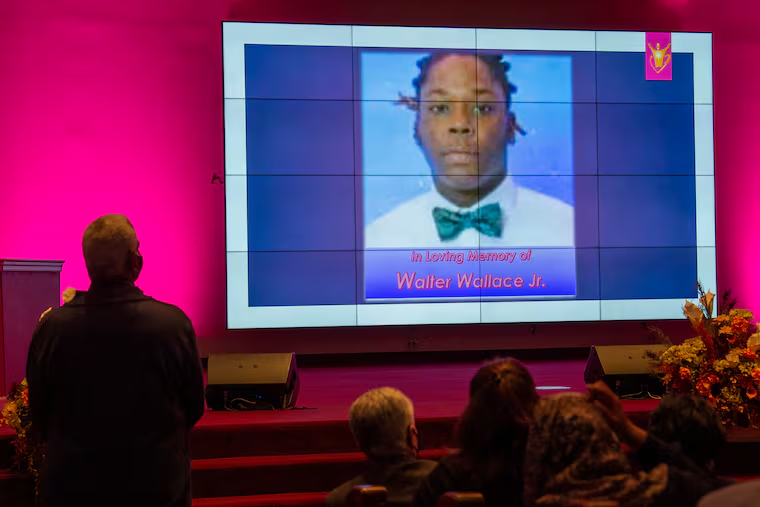As a Black woman with mental illness, I fear dying by the police | Opinion
Instead of an ambulance and trained crisis counselors, Walter Wallace's family got a dead son. I've worried the same would happen to me.

I was “flirting with the bridge.” That’s a term my outpatient case manager told me is what happens when you drive to the Golden Gate Bridge, imagine yourself jumping, and then drive home.
I’ve done terrible things out of fear when I’ve felt suicidal. I once told my best friend to comfort my mom at my funeral, because my late-night call for help went unanswered. I’ve left jobs and relationships out of fear these things would trigger a suicide attempt. But the only greater fear I have than dying by suicide is dying by the police.
According to the Treatment Advocacy Center, people with untreated mental illness are 16 times more likely to be killed by the police. Story after story demonstrates this, including the death of Walter Wallace Jr. in front of his mother, who begged members of the Philadelphia Police Department not to shoot. His mother said police officers laughed at the family during a previous response that day. Since laughing officers are no substitute for mental health treatment and medical care, the family called for help again, wanting an ambulance to come. Officers later shot and killed Wallace for holding a knife during a mental health emergency. Instead of an ambulance and trained crisis counselors, the Wallace family got a dead son.
» READ MORE: Walter Wallace Jr.’s tragic death a reminder police should not lead mental health response | Opinion
Since becoming a mental health advocate in 2014, I learned the names of Daniel Prude, Tanisha Anderson, Charleena Lyles, and many others who were killed by the police during a mental health crisis.
For a brief moment, I thought I would join that list.
In a mental health crisis, avoiding law enforcement and using private health care can deplete a person’s life savings. After telling my mom that I planned to end my life, she gave me her bonus Social Security check to pay for a therapist to keep me alive. My new therapist was a Black woman in her 30s like me, with the same twist-out 'fro I had before my big chop. I didn’t fear she would send me to a mental hospital in the back of a police car as my past therapists had tried. When my new therapist said I have borderline personality disorder, I felt relief that I would finally get help. At least once a month, I would cry as if my mother had been killed right in front of me. During the rapid mood swings and racing suicidal thoughts, my therapist was a grounding presence.
That’s why I texted her that I was suicidal: “Woke up at 2 a.m. and couldn’t go back to sleep. Kept thinking about how I don’t have a reason to live. Everything is too hard. And things are piling up. ... Nothing seems to help.”
“Did you speak with the psychiatrist and case manager?” My therapist texted this in response. She sent two more messages, but I was asleep taking a depression nap to avoid all my problems.
Then I heard the doorbell ring. I woke up to two police officers doing a wellness check.
In a bewildered state, dressed in a tank top, basketball shorts, and a satin bonnet, I walked downstairs to two San Francisco police officers. All I noticed was their guns and forced smiles. After you witness Black people who look like you get murdered by the police, law enforcement does not need to menace in order to be menacing. I stood in front of these police officers in a mental health crisis knowing that Anthony Hill of Atlanta once did, and now he is no longer here.
I did not see the point of being vulnerable with people who can kill or imprison me. If I told the police officers a quarter of my suicidal ideation, I feared I would be sent to a mental hospital or jail. So I mirrored the forced smiles of the police officers and made my voice higher to seem perfectly fine. For me, that was the best choice. A month before the police came to my house, law enforcement in Walnut Creek murdered 23-year-old Miles Hall while he was having a mental health crisis. Hall lived just a half hour away.
Cities across the United States are implementing what I would have wanted instead of the police. CAHOOTS, originated in Eugene, Ore., is a crisis support team composed of a medic and a crisis worker. In 2019, they responded to about 24,000 calls. Police backup was requested just 250 times. Oakland, Denver, and New York are developing their own crisis programs using the CAHOOTS model.
» READ MORE: Walter Wallace Jr., 27, a ‘family man’ with many mental health crises and encounters with police
In this election season, I’m learning that though you cannot vote to remove racist police officers, you can vote for people who will. Sheriffs, mayors, and city council members can call for city funding to strengthen community programs that dispatch mental health professionals instead of the police.
Suicidal people need more than hotlines and handcuffs. And when you vote, you have the ability to influence city budgets for crisis services like CAHOOTS. It was elected city council members who voted for $1.35 million in funding for Oakland’s mobile assistance program. You have the power to support people in suicidal crises so they can be their most authentic selves without the fear of being killed by the police. My life depends on your vote.
Imadé Nibokun is a writer, Jed Foundation storyteller, and mental health advocate who founded Depressed While Black.